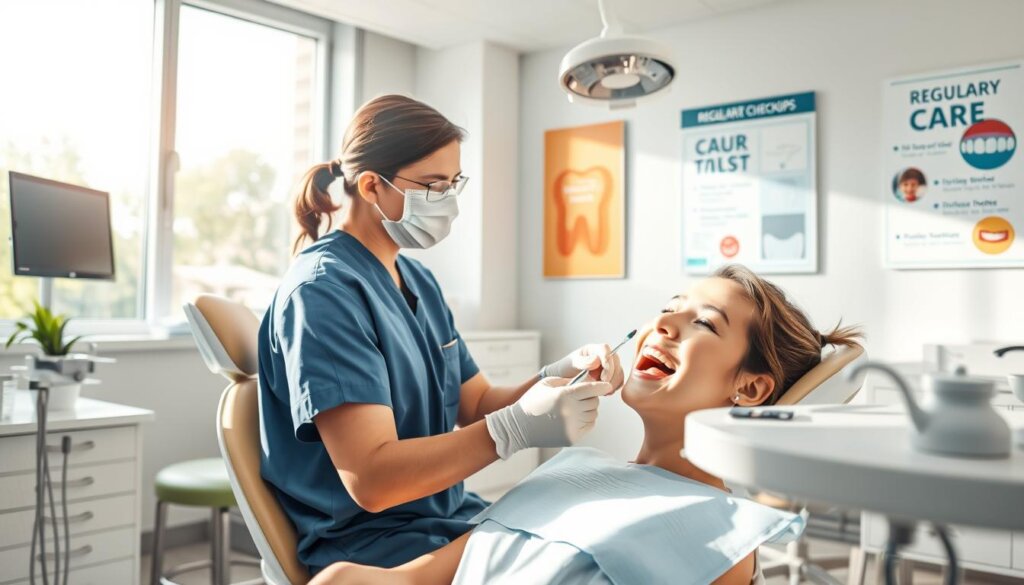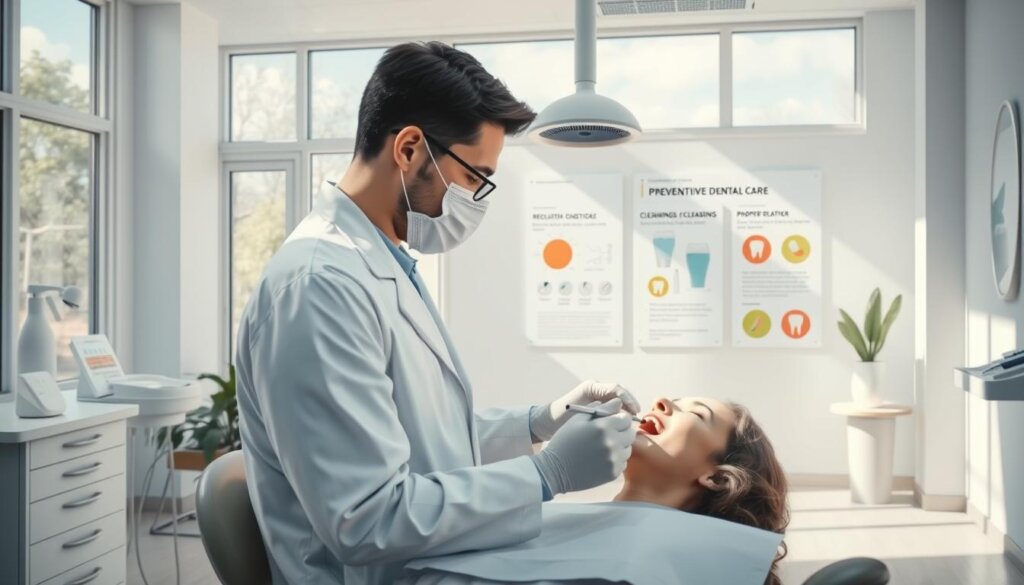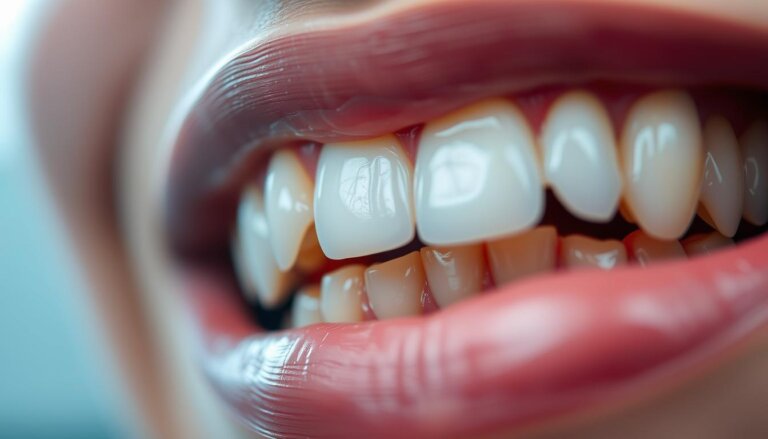How Often Should I Visit the Dentist for Check-ups?
Can you believe almost 100 million Americans skip their dentist visit every year? Health experts always advise otherwise. When talking about optimal dentist visit frequency, opinions vary. Yet, the American Dental Association (ADA) insists on at least two dental exams and cleanings every year. This recommendation aims to be flexible to each person’s needs. But one thing remains clear: regular dental visits are crucial for your oral and overall health.
These check-ups do more than just a quick look. They can spot early signs of issues like cavities or gum disease. Identifying these problems early can prevent more serious issues later on. Plus, following a dental check-up schedule fights off plaque and tartar, which cause decay. Even the Centers for Disease Control and Prevention (CDC) says yearly visits are key to staying healthy.
Seeing your dentist often helps catch problems early, before they get worse. These visits are key to maintaining a lasting, healthy smile. Here, in the dentist’s chair, you find a strong partner in your overall health quest.
Key Takeaways
- The ADA recommends a dental check-up twice a year, which should be personalized based on individual health needs.
- Regular dental visits are vital for detecting early signs of serious conditions such as cavities and gum disease.
- Professional cleanings during these visits help prevent plaque and tartar build-up, imperative for oral health.
- The CDC supports annual dental exams as a fundamental practice for preserving both oral and general health.
- A disciplined dental check-up schedule is about more than just teeth; it’s a proactive stance on comprehensive health.
Understanding the Importance of Regular Dental Visits
Going to the dentist regularly is very important for keeping your mouth healthy. These visits are not only for cleanings but also for finding and stopping mouth problems early. Knowing the value of these check-ups and the risks of missing them can help you take better care of your health and save money.
Why Routine Check-ups Matter
Dentist appointments are key for good oral health. At these visits, dentists check for cavities or gum disease that you might not notice yourself. Also, getting checked regularly means you get preventive treatments. These can greatly lower the chance of tooth decay and other mouth issues.
Potential Consequences of Skipping Visits
If you don’t go to the dentist often, you could face serious health problems. Small issues could become bigger, making them harder and more expensive to fix. Below is a table showing what could happen if you ignore dental check-ups:
| Issue Detected | Possible Consequence If Unchecked | Benefit of Regular Detection |
|---|---|---|
| Plaque and Tartar Buildup | Increased risk of gum disease and tooth decay | Periodic cleaning to prevent serious disease |
| Silent Cavities | Progress to pain and potential tooth loss | Early fillings to preserve tooth structure |
| Early Signs of Oral Cancer | Possible progression to later, untreatable stages | Immediate intervention and increased survival rate |
Therefore, going to the dentist regularly is crucial, not just a routine. It’s essential for keeping your mouth and body healthy. Making these visits a priority is a smart way to invest in your health future.
Recommended Frequency for Dental Check-ups
Following dental check-up recommendations is key for good oral health at any age. It’s important to know when to see the dentist to keep your mouth healthy. Having regular check-ups helps catch problems early and keep your teeth in top shape.
General Guidelines for Adults
Adults should visit the dentist once or twice a year. This frequency helps spot any issues early on. But, people might need to go more often based on their oral habits and past dental problems.
Special Recommendations for Children
Kids should see a dentist when their first tooth shows or by their first birthday. After that, they might need to go every six months. This helps keep an eye on their teeth’s growth and start taking care of their teeth early.
Adjustments for Seniors
Seniors might need to go to the dentist every three to four months. As we age, problems like dry mouth and root decay become more common. It’s crucial for older people to visit the dentist regularly to keep their teeth healthy.
Factors Influencing Dental Visit Frequency
How often you need to see a dentist depends on many things. Knowing these factors helps tailor your dental care for the best oral health.
Personal Oral Health Conditions
Your oral health status is key in deciding visit frequency. People with many fillings or gum disease might visit the dentist more. They face a higher risk for oral health problems. A detailed assessment of dental disease risk looks at these issues to plan care.
Lifestyle Choices and Habits
How well you look after your teeth every day matters a lot. Good brushing and flossing mean fewer dentist visits. But bad habits could lead to more appointments. Choices like smoking or eating lots of sugar can harm your teeth, needing more dentist care.
Family Dental History
Family history also affects how often you need dental checks. If your family has had gum disease or cavities, you might need more visits. This risk makes it important for more checks by dentists.
| Factor | Impact on Visit Frequency |
|---|---|
| Current Oral Health | More issues require more frequent visits |
| Hygiene Habits | Poor habits necessitate more frequent cleanings |
| Dietary Choices | Diets high in sugar increase visit frequency |
| Family History | Genetic predispositions can increase the need for frequent check-ups |
| Smoking | Smokers may need more frequent dental assessments |
Dentists use these factors to advise on how often you need check-ups. This advice is based on your unique health and lifestyle.
What to Expect During a Dental Check-up
Going to the dentist is key for keeping your mouth healthy. It should be a regular part of taking care of yourself. A full dental check-up checks and improves your dental health, making you healthier overall. We’ll explain what happens during each visit and why it’s important to go regularly.
Initial Assessment and Medical History
Your dentist starts by updating your health records at each check-up. This is important. It lets your dentist tailor your treatment based on any new health conditions or medications that might affect your teeth.
Professional Cleaning of Teeth
The professional cleaning part of your visit is very important. Dentists carefully get rid of plaque and tartar that you might miss when brushing. This isn’t just to make your teeth look better. It prevents tooth decay and gum disease, keeping your mouth healthy.
X-rays and Diagnostic Procedures
Dentists use x-rays and other tools to see things that aren’t visible to the eye. This is key for spotting problems like hidden tooth decay or issues with your jaw bone early. Finding these issues early can save you time, pain, and money later.
Going to the dentist regularly is important for stopping serious dental problems. Each visit gives your dentist a chance to find early signs of trouble, keeping your teeth healthy. Regular check-ups do more than keep your mouth healthy; they’re part of taking care of your overall health.
Signs You Need to See a Dentist Sooner
Noticing symptoms that need a dentist’s look early can really help keep your teeth and gums healthy. Issues like persistent tooth pain, swelling, or changes in how your mouth feels could mean you have bigger problems. These signs show you might need an urgent dental visit.
If persistent tooth pain sticks around even after you’ve tried things like flossing or rinsing with salt water, it’s time to see a dentist. Pain could signal decay or an infection that, without treatment, might get much worse.
- Discomfort when chewing might mean you have cavities or gum disease.
- Sensitivity to hot or cold could come from losing enamel or gums pulling back.
- Changes in how your teeth look, like chips or cracks, need a dentist’s immediate look to stop more damage.
Gums can also have problems that mean you should see a dentist right away. Signs like bleeding when you brush or red, swollen gums can point to gingivitis or gum disease. Don’t ignore these signs—get to a dentist fast.
Noticing changes in your mouth, such as discoloration, lasting bad breath, or a strange feel, is important. These changes might seem small but can lead to big health issues.
By being quick to respond to these symptoms and getting dental advice, you can stop oral diseases from getting worse. Also, don’t forget about regular dental visits. They’re key not just for fixing problems but for preventing new ones.
The Role of Preventive Care in Dentistry
Preventive dental care is key to stopping diseases in dentistry. By going to the dentist regularly, people benefit from the advantages of consistent dental visits. This includes spotting oral health problems early. These steps are vital for keeping teeth healthy and can help cut down on dental bills in the long run.
It’s important to realize how regular dental check-ups can benefit us. This helps encourage more people to follow a schedule of preventive care. Below, we look at some major benefits that preventive care offers for both health and saving money.
Benefits of Regular Preventive Check-ups
- Early detection and management of oral diseases.
- Guidance on proper oral hygiene practices.
- Assessment and reinforcement of personal oral care routines.
Cost Savings in the Long Run
| Without Preventive Care | With Preventive Care |
|---|---|
| Increase in emergency procedures | Regular monitoring reduces emergency visits |
| High costs from advanced treatments | Lower expenses due to early interventions |
| Frequent restorative treatments | Decreased need for restorative care |
In short, preventive dental care is like saving money for the future. The advantages of consistent dental visits show in better tooth health and big savings over time. By avoiding big dental procedures with regular visits, we keep future dental costs down. This matches the goal of reducing long-term dental costs.
How to Prepare for Your Dental Visit
Getting ready for a dental check-up is key to getting top care. This means doing things to make your visit go smoothly and taking steps to talk well with your dentist. We’ll look at how to get ready so your next dental visit is easier and more helpful.
Checklist Before Your Appointment
Making a checklist for your dental visit can keep you organized. This checklist is a big help in getting ready for a check-up. It’s a smart move for patients.
| Item | Description |
|---|---|
| Insurance Information | Confirm your dental insurance details and bring any necessary documents. |
| Health Changes | Note any recent health changes or symptoms that could affect your dental health. |
| Medications List | Prepare a current list of medications, including dosages and reasons for taking them. |
| Previous Dental Records | If you’re visiting a new clinic, arrange to have your previous dental records transferred. |
| Questions for Dentist | Write down any questions or concerns to discuss during your visit. |
Communication Tips for Patients
Talking well with your dentist is crucial for great dental care. Good communication can clear up any procedure details and help with nervousness. It also builds trust. Here’s how you can talk better:
- Be Honest – Share your dental and medical history truthfully for the right treatment.
- Express Concerns – Don’t be scared to tell them if you’re nervous or uncomfortable.
- Ask for Clarification – If there’s something you don’t get, ask. Knowing what will happen is important.
- Provide Feedback – Give feedback after your visit to help make future visits better.
Oral Health Maintenance Between Visits
Keeping your teeth healthy between dentist visits is key for lasting dental health. It’s important to focus on thorough dental care and how eating affects your teeth. Here, you’ll find tips for daily dental care and eating right to keep your mouth healthy.
Daily Dental Hygiene Practices
Having a solid daily dental care routine is essential. Brushing twice a day and flossing at least once helps remove plaque and stop tartar from building up. This can prevent gum disease and cavities. Adding interdental brushes and mouthwash to your routine cleans spots regular brushing misses.
People with braces, implants, or bridges need to take extra steps in their care routine to clean hard-to-reach areas.
Importance of a Balanced Diet
What you eat plays a huge role in keeping your teeth and gums healthy. Eating foods full of vitamins, minerals, and antioxidants helps keep your teeth and gums strong. You should eat more fruits, veggies, dairy, and lean proteins. They help build strong teeth and reduce the risk of dental problems.
Try to limit sugary snacks and acids in drinks that cause decay and wear down your enamel.
- Regularly replace your toothbrush every three to four months or sooner if the bristles are visibly matted or frayed.
- Integrate fluoride toothpaste into your brushing routine to help strengthen tooth enamel and fight decay.
- Hydrate adequately to stimulate saliva production, a natural defense against tooth decay.
Following these tips can make your oral health better and improve your general well-being. Keep track of your dental habits and eat wisely. This will help keep your smile bright between dentist visits.
Cost Considerations for Dental Visits
Knowing the financial aspects of dental care is key for managing your healthcare budget. Costs for dental visits change a lot based on where you are, the dental practice, and what services you get. Using dental insurance plans helps lower the burden, making it easier and more predictable to get dental care.
Dental insurance usually covers routine check-ups, which help keep your teeth healthy. But it’s important to check your dental insurance plan’s details because what’s covered can vary a lot between providers. Looking into these plans shows the complex but important role of insurance in handling the financial aspects of dental care.
| Service | Average Cost Without Insurance | Average Cost With Insurance |
|---|---|---|
| Initial Oral Examination | $50 – $200 | Covered at 100% |
| Dental Cleaning | $75 – $200 | Covered at 70-100% |
| X-Rays | $25 – $250 | Covered at 50-100% |
| Fluoride Treatment | $20 – $50 | Covered at 70% |
Some employers offer dental insurance as part of wellness programs. They see the benefits of better health and lower long-term medical costs. For patients, knowing and using these benefits helps greatly in managing dental visit costs effectively.
The Connection Between Oral Health and Overall Health
The oral-systemic health link shows how important our dental health is to our whole body’s wellbeing. It’s very important to understand this link well. This understanding helps us care for our health in every way.
Dental problems, like gum disease, can affect other parts of our body too. This shows how important our dental health is to our overall health. A healthy mouth helps us stay healthy overall.
- Diabetes: Poor oral health can make blood sugar control harder, leading to bigger health problems for diabetics.
- Heart Disease: Studies have found that gum disease might be connected to heart disease, because of the inflammation oral bacteria causes.
- Respiratory Infections: Bacteria from bad teeth and gums can get into the lungs or bloodstream, causing breathing problems.
These examples show why dental care is so important for staying healthy overall. Taking good care of your teeth is a key part of staying healthy.
Keeping your mouth clean and seeing a dentist regularly are key steps to avoid health issues. These actions are important for both dental health and overall wellness.
It’s crucial that dental and medical professionals talk to each other to improve patient care. This teamwork approach helps us take better care of our health, showing how connected our dental and overall health are.
What to Discuss with Your Dentist
Talking about your oral health during dental visits is very important. It helps make your dental care better. And it leads to healthier teeth and gums.
Topics for dentist discussion should be about your teeth problems and how to keep your mouth healthy. These talks can help you find out how to take care of your mouth. They also help catch any issues early on.
| Aspect of Discussion | Reasons to Discuss | Impact on Dental Care |
|---|---|---|
| Current Oral Health | To assess the need for targeted treatments or interventions. | Aids in customizing care plans and preventive strategies. |
| New Symptoms or Pain | Swift identification and diagnostic of emerging issues. | Prevents the progression of dental problems through early intervention. |
| Daily Hygiene Practices | To evaluate the effectiveness of current oral care routines. | Strengthens home care regimen, fortifying preventive measures. |
| Preferences in Treatment Options | Ensures patient comfort and compliance with proposed dental procedures. | Selects the most suitable and congruent treatment plans for the patient. |
Interactive dental visits let you share your worries. This is key for dentists to give you the right support and advice. When you talk openly and set clear expectations, you and your dentist build a trustful relationship. This is very important for your dental health. It makes sure your dental care helps your teeth and your overall well-being.
The Impact of Technology on Dental Care
Technology is changing the game in dental care around the world. Now, high-tech tools are key for accurate diagnostics and treatments. They make dental visits and the overall patient experience much better.
Thanks to these advancements, dentists can spot issues with amazing precision, work faster, and offer better care. This change helps dental clinics become more than just places to get your teeth checked—they’re becoming advanced health centers.
Innovations in Dental Check-ups
- Digital X-rays and Imaging: These give clear pictures of the mouth, find problems early, and are safer with less radiation.
- Intraoral Cameras: They let dentists see parts of the mouth that are usually hard to check, improving diagnosis and patient understanding.
- Laser Dentistry: Lasers help in many ways, like fixing cavities or reshaping gums, with less pain and quicker healing.
How Technology Enhances Patient Experience
- Reduced Appointment Times: Modern tools help speed up dental visits, so patients spend less time in the chair.
- Increased Comfort: With laser therapy, there’s no need for drills or cuts, making treatments more comfortable.
- Improved Results: Better accuracy in treatments means patients see better results after their dental appointments.
With these tech tools, dentists can provide top-notch care, making check-ups detailed yet not scary. This leap forward doesn’t just raise health service standards. It also makes the overall experience at the dentist’s office better for everyone.
Finding the Right Dentist for You
Choosing the right dentist involves more than just location or cost. It’s crucial to look at the dentist’s skills, what services they offer, and reviews from other people.
Reviews from others play a key role. Patient feedback in dentist choice helps you understand the care quality, the dentist’s way of communicating, their office setting, and how reliable they are. It’s important to know how to sort through this info.
Tips for Selecting a Dentist
- Evaluate credentials and specialization to ensure they meet your oral health needs.
- Assess the range of services offered to ensure comprehensive care, from preventive to corrective treatments.
- Consider logistics such as location, office hours, and appointment availability to fit your schedule.
The Importance of Patient Reviews
Patient reviews are key when choosing a new dentist. They give you a better idea about how satisfied other patients are and the results of their treatments.
| Aspect Reviewed | Average Rating |
|---|---|
| Clinical Competency | 4.5/5 |
| Communication and Clarity | 4.8/5 |
| Wait Times and Accessibility | 4.0/5 |
| Overall Patient Satisfaction | 4.7/5 |
Deep diving into detailed reviews helps you form a better picture. This way, you can choose a dentist that fits your needs perfectly.
Common Misconceptions About Dental Visits
Many people get the wrong idea about dental visits, putting their health at risk. It’s important to bust these myths for better dental health. Getting regular cleanings is not just for a bright smile. It’s essential for spotting health problems early. By understanding more about oral health, we see its role in our overall wellness. Regular dental check-ups are crucial.
Myth vs. Fact: Dental Visit Frequency
Some think you only need the dentist when there’s pain or a visible problem. This is a big myth. Having check-ups before problems start is key. This stops big issues from developing. It’s smart to get check-ups often, maybe twice a year, but it varies per person.
Addressing Fear and Anxiety Around Check-ups
Fear can keep people from the dentist. It’s often the fear of pain or bad news. But dentists work hard to make visits stress-free. They use gentle methods and explain everything clearly. This helps to reduce worry. The goal is to make dental visits a positive step for oral health.







